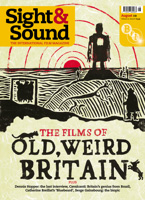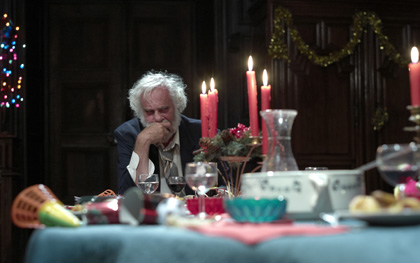Primary navigation

France/Switzerland/United Kingdom 2009

Reviewed by Nick Bradshaw
Our synopses give away the plot in full, including surprise twists.
Switzerland, the present. An opening montage of found footage of people playing archaic games, including walking off the ground on props, segues into scenes of the Ivul family – Andrei and Marie, their teenage daughter Freya and son Alex, and younger daughters Manon and Capucine – striking group poses on the front steps of their chateau in the Pyrenees. Freya is preparing for a trip to Russia, despite Alex’s possessive feelings for her. When she instructs him to kiss her farewell on her stomach, and beyond, Alex gets carried away, whereupon Andrei and the family labourer Lek burst in. Andrei banishes Alex from his land, and Alex angrily accedes. Marie drives Freya away, then yells at Alex in the woods on her way home.
Time passes; we see Alex party from his forest perches with a group of local youths, but his bedroom remains empty. Marie tries to make peace but Alex does not emerge; Andrei continues to make light of the situation. Over Christmas dinner both parents get unhappily drunk, Andrei calamitously so – such that spring finds him paralysed and Freya back home as nursemaid. One evening, after bringing her drunk mother home from the pub, Freya snaps and yells questions and taunts for Alex in the woods.
Summer. Freya finds Alex in a caravan that he has suspended from the trees. She joins him on its bed; as they kiss and embrace, Lek lights a bonfire under the caravan. Freya gets out and shouts to Alex to join her, seemingly in vain. The screen dissolves to a long shot of Alex walking along the walls of a ruined castle.
For a film-maker who can seem so away with the fairies, Andrew Kötting has a distinctly elemental, materialist sensibility. Gallivant (1996) explored the fringes of British folk life (both cultural and generational) on the cusp of land and sea, in a picaresque round-tour of the country’s coastline with his granny and daughter. This Filthy Earth (2001), a gap-toothed transplantation of Zola’s La Terre to inland Cumbria, stirred up a bewitched cauldron of provincial atavism concerning stick-in-the-mud farm folk and their bodily fluids.
The latter was one of the first experiments from the shortlived FilmFour Lab venture, since when Kötting has been forsaken by UK funding. Shot near his Franco-Swiss home from home (and dedicated to his mother Rita, “who managed to hold the family together”), Ivul is a product of exile, a condition explicitly etched into the narrative. Set in the forested grounds of an alpine chateau, it concerns a Russian émigré family of six whose eldest son Alex (Jacob Auzanneau) takes to the trees when his father expels him from the nest for seemingly sexualising his farewell to his elder sister Freya (Adélaïde Leroux), on whom he has some kind of crush. (Freya herself is leaving home on a recce to Russia where, she teases Alex, she will find men with droopy moustaches to kiss, never to return.) The seasons change; Alex’s resolution does not – he becomes a Tarzan or Kaspar Hauser in reverse, swinging silently across the landscape, living off nuts and animals. Or so it seems; the film is less interested in Alex’s means of survival than in the lacuna his stubbornness leaves at the heart of the family. His mother Marie (Aurélia Petit) and father Andrei (Jean-Luc Bideau) both crack and take to the bottle, most notably over a derelict Christmas dinner which ends with a paralytically drunk Ivul collapsing into a coma.
Like This Filthy Earth, Ivul is least interesting in its narrative impulse; it’s more redolent as a tone poem of landscape, bodies and madness. Ivul pompously claims the mantle of cultivating influence – “A civilisation develops when old men plant trees, knowing they’ll never rest in their shade,” he tells Alex, shortly before throwing him off his land – and the film is full of arboreality: rolling meadows and conifers, branches that entwine, support or yield, not to mention found footage of great trunks being felled. Kötting makes much of the film move at something like woodland time: days, nights and the seasons ebb in and out in time-lapse; the moon seems bound to conjure some pixie troupe or horde of sprites.
Kötting and his editors David Dusa and Baptiste Evrard also give the film articulation and rhyme through frequent medleys of archive clips: great ice floes introduce a postcard from Freya in Russia; bustling microbes suggest under-the-skin passions; Ivul’s incapacitation is rendered with sped-up old images of surgeons at the ready; strange folk games and japes – bucket-walking, pillow fights – top and tail the film. And Christian García’s glitchy electro-shuffle soundtrack (pistons and a choir accompanying that Christmas) underscores the sense of a Gaian distemper, something abrood in the blood. So too, perhaps, do Nick Gordon Smith and Gary Parker’s dynamic, Steve Bochco-inflected camerawork and its fidgety editing.
If the aloof Alex becomes little more than a wisp in the film, his family are ruddier presences. Bideau is a rollicking scene-hog even when playing comatose. Capucine and Manon Aubriot – playing Alex and Freya’s younger siblings of the same names – make an entertainingly innocent double act. And lingering and lurking around the edges of the frame is Xavier Tchili’s mute farm help Lek, the same mysterious witness from This Filthy Earth, who may continue his way into Kötting’s mooted next feature, set underneath the earth.
Play away: Andrew Kötting talks to our Young Journalism Competition winner Jamie Chadd about film art, Ivul and life in the French tree-tops (online, October 2010)
This Filthy Earth reviewed by Peter Matthews (December 2001)
Reasons to be cheerful: Ryan Gilbey says UK cinema is remembering its bad manners (October 2002)
Simon Magus reviewed by Ken Hollings (July 2000)
Tarzan (Disney) reviewed by Leslie Felperin (November 1999)